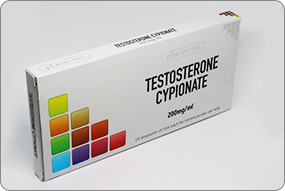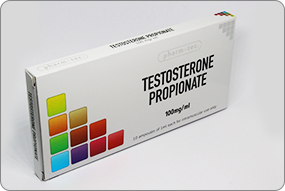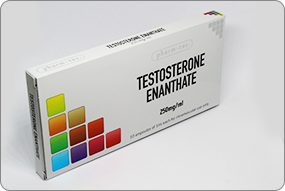TESTOSTERONE Enanthate
Original price was: 129,00€.109,00€Current price is: 109,00€.
Description
Testosterone Enanthate contains 250mg per 1 ml of Testosterone Enanthate as the active ingredient. The Injection fluid also contains benzyl alcohol and arachis oil.
Mechanism of action
Testosterone exerts both genomic and non-genomic effects in the human body. This means that while many of testosterone’s effects are mediated by the androgen receptor, and gene transcription, many also occur without such stimulation. Testosterone promotes health and well-being, enhances libido, increases energy and promotes fat loss. It can also boost immunity. Testosterone aids in gaining and preserving lean muscle mass. It prevents against bone loss as well as heart disease.
Usage
Testosterone Enanthate is used in men who do not make enough of a natural substance called testosterone. In males, testosterone is responsible for many normal functions, including growth and development of the genitals, muscles, and bones. It also helps cause normal sexual development (puberty) in boys.
Indications
Male Testosterone Enanthate Injection is indicated for replacement therapy in conditions associated with a deficiency or absence of endogenous testosterone. Primary hypogonadism (congenital or acquired) – Testicular failure due to cryptorchidism, bilateral torsion, orchitis, vanishing testis syndrome, or orchidectomy. Hypogonadotropic hypogonadism (congenital or acquired) – Idiopathic gonadotropin or luteinizing hormone‑releasing hormone (LHRH) deficiency, or pituitary-hypothalamic injury from tumors, trauma, or radiation. Delayed puberty – Testosterone Enanthate Injection, may be used to stimulate puberty in carefully selected males with clearly delayed puberty. Female Metastatic mammary cancer – Testosterone Enanthate Injection, USP may be used secondarily in women with advancing inoperable metastatic (skeletal) mammary cancer who are one to five years postmenopausal. In patients with breast cancer and in immobilized patients, androgen therapy may cause hypercalcemia by stimulating osteolysis. In patients with cancer, hypercalcemia may indicate progression of bony metastasis. If hypercalcemia occurs, the drug should be discontinued and appropriate measures instituted. Prolonged use of high doses of androgens has been associated with the development of peliosis hepatis and hepatic neoplasms including hepatocellular carcinoma. Peliosis hepatis can be a life-threatening or fatal complication. If cholestatic hepatitis with jaundice appears or if liver function tests become abnormal, the androgen should be discontinued and the etiology should be determined. Drug-induced jaundice is reversible when the medication is discontinued. Geriatric patients treated with androgens may be at an increased risk for the development of prostatic hypertrophy and prostatic carcinoma. Due to sodium and water retention, edema with or without congestive heart failure may be a serious complication in patients with preexisting cardiac, renal, or hepatic disease. In addition to discontinuation of the drug, diuretic therapy may be required. If the administration of Testosterone Enanthate is restarted, a lower dose should be used. Gynecomastia frequently develops and occasionally persists in patients being treated for hypogonadism. Androgen therapy should be used cautiously in healthy males with delayed puberty. The effect on bone maturation should be monitored by assessing bone age of the wrist and hand every six months. In children, androgen treatment may accelerate bone maturation without producing compensatory gain in linear growth. This adverse effect may result in compromised adult stature. The younger the child the greater the risk of compromising final mature height.
Drug interactions
When administered concurrently, the following drugs may interact with androgens: Anticoagulants, oral – C-17 substituted derivatives of testosterone, such as methandrostenolone, have been reported to decrease the anticoagulant requirement. Patients receiving oral anticoagulant therapy require close monitoring especially when androgens are started or stopped. Antidiabetic drugs and insulin – In diabetic patients, the metabolic effects of androgens may decrease blood glucose and insulin requirements. ACTH and corticosteroids – Enhanced tendency toward edema. Use caution when giving these drugs together, especially in patients with hepatic or cardiac disease. Oxyphenbutazone – Elevated serum levels of oxyphenbutazone may result.
Drug interactions
When administered concurrently, the following drugs may interact with androgens: Anticoagulants, oral – C-17 substituted derivatives of testosterone, such as methandrostenolone, have been reported to decrease the anticoagulant requirement. Patients receiving oral anticoagulant therapy require close monitoring especially when androgens are started or stopped. Antidiabetic drugs and insulin – In diabetic patients, the metabolic effects of androgens may decrease blood glucose and insulin requirements. ACTH and corticosteroids – Enhanced tendency toward edema. Use caution when giving these drugs together, especially in patients with hepatic or cardiac disease. Oxyphenbutazone – Elevated serum levels of oxyphenbutazone may result.
Dosage and directions for use
Total doses above 400 mg per month are not required because of the prolonged action of the preparation. Injections more frequently than every two weeks are rarely indicated.Use of a wet needle or wet syringe may cause the solution to become cloudy; however this does not affect the potency of the material. Parenteral drug products should be inspected visually for particulate matter and discoloration prior to administration, whenever solution and container permit. Testosterone Enanthate injection is a clear, colorless to pale yellow solution.
Preservation
Keep out of the reach and sight of children. Do not store above 30°C. Keep in the original package or container supplied. Do not use this product after the expiry date that is stated in the outer package. The expiry date refers to the last day of the month. Medicines should not be disposed of via wastewater or household waste. Ask your pharmacist how to dispose of medicines no longer required. These measures will help to protect the environment.
10x1ml
Total doses above 400 mg per month are not required because of the prolonged action of the preparation. Injections more frequently than every two weeks are rarely indicated.
Intramuscular Injection 250mg/ml
You must be logged in to post a review.




Reviews
There are no reviews yet.